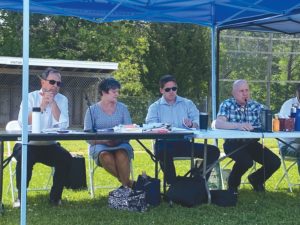WELLFLEET — Town meeting voters approved nearly all of the 54 articles on the warrant on Saturday, including a $24.9-million operating budget, a $1.1-million capital budget, a $2.2-million sprinkler system for the elementary school, and $400,000 in Proposition 2½ overrides for two new police officers and two firefighters or EMTs.
While the four overrides and one debt exclusion (for the sprinklers) passed by two-thirds majority votes at the meeting, they will need to be affirmed at a special election on Tuesday, June 21. If all are approved, property taxes on a house of median value ($619,000) would rise by $546, said former interim Town Administrator Charlie Sumner.

Select board chair Ryan Curley asserted that an increase in the residential tax exemption from 20 to 25 percent would “offset most of the tax increase” for year-round residents, although his analysis appeared to be faulty. For the owner of a median-value house, the increased residential exemption would save about $240, not the $408 Curley mentioned.
The meeting drew 266 voters to the ballfield across from the Wellfleet Elementary School.
Select board members and town staff urged voters to pass the operating override to avoid cuts to various town services, including recreation, child-care vouchers, library staff and operating hours, and amnesty day at the transfer station.
The 2.4-percent increase from the previous fiscal year will ensure that the budget is level-funded, Sumner said, without needing to depend on debt exclusions or using other one-time revenue streams, local receipts, and reserves, like draining the ambulance fund each year, as was done in the past. Sumner had already resumed his retirement, but attended the meeting with new Town Administrator Richard Waldo, who started on May 31.
“The last time we had an operating override was over 15 years ago,” select board member Mike DeVasto said. Silverman confirmed that the last operating override was at the 2005 Annual Town Meeting, for $400,000.
“I can’t express how excited I am to put that chapter in the rearview mirror,” said DeVasto of the town’s extended financial debacle. “I can confidently say that we are in a better place than we were prior to the accounting crisis.”
Select board member John Wolf said that the town also faces “a credibility gap,” which must be addressed by the new town administrator and finance department staff.
Wolf warned against taking a punitive stance toward “the outright incompetence that has taken place in the past.” But he questioned DeVasto’s rearview mirror metaphor, saying that “a good helmsman is aware of what’s going on in the back as well as what’s coming up ahead.”
The biggest item on the warrant was the $2.2-million fire suppression system at Wellfleet Elementary School. Steven Kopits asked if the expensive system was “absolutely necessary.” Fire Chief Rich Pauley replied that the town was violating state law and that fire marshals could close the school building down.
“Should there be a fire, the cost of sprinklers would be modest in comparison to the town’s liability,” Wolf commented.
Supplemental funding of $334,500 for a fuel storage tank at the marina was approved. The new tank would be underground in the same location as the old tank, according to Harbormaster Will Sullivan.
Police Chief Michael Hurley and Fire Chief Pauley urged voters to approve increases in their departments without further delay. The need has been present for several years, they said, but funding was put off due to the town’s financial disarray.
Voters approved Article 46, placing a community impact fee of 3 percent on “professionally managed” short-term rentals. Article 47, also adopted, expands the provision to include owner-occupied properties.
The money collected from the impact fees will be placed in two stabilization funds established by the town meeting: 35 percent of the funds will go into an affordable housing stabilization fund, aimed at providing housing for those earning less than 80 percent of area median income (AMI). The remaining 65 percent will go to a mixed-income housing stabilization fund, to benefit those who make more than 80 percent of AMI but still struggle to afford housing in town.
Other articles approved at the meeting included authorization of an easement for the Herring River Restoration Project and a nonbinding resolution asking the select board to draft a tree preservation bylaw.
The 54-article warrant was dispatched in just over four hours, a significant improvement over last year’s annual town meeting, which took six and a half hours.



